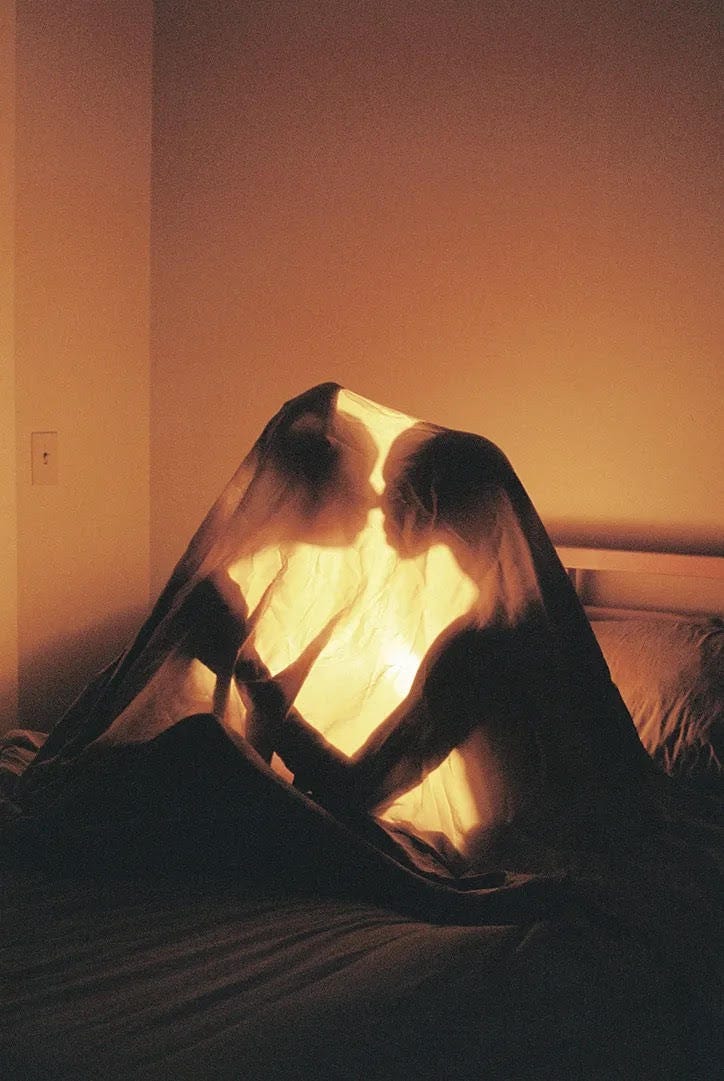-Deana Lawson, Binky & Tony Forever
Listen while you read. Find the “Eros Never Stops Dreaming” Playlist Here.
Love is a beautiful thing. Many have said, at the end of their life, that love was the only thing that mattered. Though a goal of many is to find “true love,” it can be said that the great ambition of our psyches is to Individuate, or as the Jungian scholar Marie Louise von Franz put it, “[to consciously come-to-terms] with one’s inner center or Self.” What we find at the center of most things is balance. We meditate to quiet the flaring thoughts on the fringe and “return to center.”
We trace the spiral and navigate the labyrinth all in an attempt to reach the heart or middle. The thing is, we humans are terrible at balance. Whether it be work/life, school, temperance, time management, diet, exercise, or what have you, we are famous for meeting the balance point briefly before swinging wildly toward the distant pole. Balance is not static. It is an active process of mindfulness. Despite our notoriety for losing it, we are even more famous for trying again.
-Unknown Artist
As Jungian analyst Daryl Sharp defined it, individuation is, “a continual process informed by the archetypal ideal of wholeness.” We discussed in Part I of this series how we are already whole, that wholeness is innate, and that the age-old search for our “missing piece” is a fallacy. But the idea of individuation is to continually uncover oneself over time. In doing so we discover a sense of “wholeness” that is more like a progressive “de-compartmentalization.” Where once our fullness was obscured, we now move deeper into a more holistic understanding of Self. The goal of individuation is not to become perfect or overcome oneself, but rather, to increase awareness of one’s own psychological experience. To walk the personal labyrinth and find what’s at the center of who we are.
In Carl Jung’s view, no one is ever fully individuated. One can only take incremental steps toward “wholeness,” or away from fragmentation. But this center-point we are speaking of, the capital-S Self, remains our guiding star, something we are magnetized toward whether we are conscious of it or not. And this growing process is not without its pain.
-Debbie Parker
Jung found that “individuation cuts one off from personal conformity and hence from collectivity.” Throughout the process of finding our center, our Self, we lose our attachment to “the mask” that exists as the shorthand descriptor of who we are to both ourselves and to others. So as we expand, we go beyond previous limitations that we had imagined for ourselves. This, of course, can be uncomfortable. And we may even become aware of aspects of ourselves that others may outright reject or find unacceptable. And yet, wrote Jung, “individuation does not shut one out from the world, but gathers the world to itself.”
It can be frightening to move toward that which others might not accept, but all growth requires shedding. We cannot limit ourselves to the acceptance of what’s known. A flower is not afraid to bloom. By being faithful and responsive to ourselves, and trusting the process of becoming who we are, we find new ways of knowing and being known by others. I suppose the question then is how do we work our way through the process of individuation? There’s an old story that may help us illustrate…
-Psyche & Eros by Alison de Vere
As the story goes, Psyche was a princess of immense beauty, and so sweet was she that she was beloved by all. With her popularity verging on worship, the Goddess Aphrodite grew jealous. To punish this perceived heresy, Aphrodite sent her son, Eros, the God of Love, to shoot the mortal Psyche with an arrow so she would fall in love with a lowly human beneath her station, humbling the princess. However, in error, Eros shot himself and Psyche became the object of his unquenchable desire.
Enraged by her son’s mistake, Aphrodite sent storms across the land. To restore justice, she produced visionary dreams in the mind of Psyche’s father, the local King. In the first vision, Psyche was alive and well, but there was famine, drought, war, and death throughout the kingdom. In the second, Psyche was gone but the people all lived happily and the kingdom thrived in an age of prosperity. The choice belonged to the King–sacrifice his daughter or the whole of his people would perish.
Distressed at such a decision, eventually the King decided that Psyche would be offered as tribute. However, dear Psyche went willingly. So honorable was she, that the princess flung herself from a cliff in an act of self-sacrifice to serve the collective. But Psyche was saved at the last moment by the love-sick Eros who rescued her and snuck her away to his secret lair, where she could live out her days hidden from the violently envious Aphrodite.
-Clifford Prince King, Communion
Now, it should be noted that Gods and humans were not meant to see one another. So Eros’ “love den” was dark inside, and, as a rule, Psyche was not to look upon Eros, and light was forbidden. Without sight, Eros wooed Psyche and, over time, the two fell madly in love. But, homesick, Psyche was allowed a visitation from her two sisters who, like Aphrodite, grew jealous of Psyche’s favorable situation. In their envy, the sisters planted doubts about Eros and his intentions. “What if he’s a demon? I mean, you’ve never seen this man before. What if he’s put you under an evil spell?”
Their doubts eventually took hold of Psyche, who concluded it was not too much to ask to see the stranger who had saved her life and had now seduced her in some dark, unknown land. That night, she waited until Eros had gone to sleep and lit an oil lamp to see her lover at last.
Now, it wouldn’t be a good story if some clumsy mistake did not occur, and this is a good story. While lighting the lamp, Psyche spilled a drop of hot oil onto Eros’ wing, waking him in anger. Betrayed beyond belief, the God of Love flew away and abandoned poor Psyche. To win back his love, she would have to survive great trials and tribulations to prove she deserved Eros back. But we’re not here to talk about that today. What we want to talk about is how this story reflects the balance required in a romantic relationship…
Don’t you care for my love? she said bitterly.
I handed her the mirror, and said:
Please address these questions to the proper person!
Please make all requests to head-quarters!
In all matters of emotional importance
please approach the supreme authority direct!—
So I handed her the mirror.
-D.H. Lawrence, Intimates
-Clip from the movie, Romeo + Juliet
The story of Eros and Psyche is a wonderful allegory for the intermarriage of knowledge and desire within us all. But it’s important to note that these two characters represent two energies that live within each of us. Though we’ll continue speaking about the framework of the story, let’s not forget that this is a metaphor symbolizing our interior drama.
As illustrated, doubt creeps into the mind of Psyche and she is driven to know. Psyche senses fear and, as is our human condition, uses her namesake (the lower-case-p psyche) to solve her crisis. She tries to think her way out of the fear and lights a lamp to see that which she does not yet know. This pull toward illumination is understandable. We have a natural bias that, like a rip-tide, moves us unwittingly into knowing. But to sustain a long-term relationship, one must keep an eye on this tendency. As becomes clear in the story, when we are dealing with love and relationships, our pursuit of absolute clarity can drive away the very love we seek.
-Rene Magritte, The Lovers II
Keep reading with a 7-day free trial
Subscribe to Inner Vision to keep reading this post and get 7 days of free access to the full post archives.









